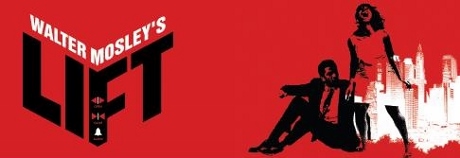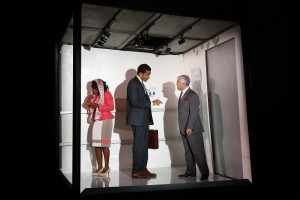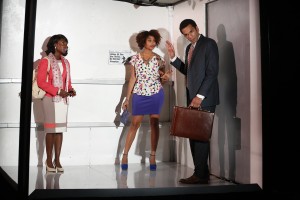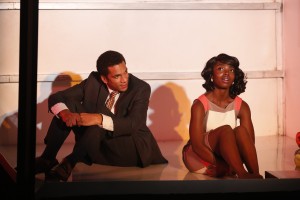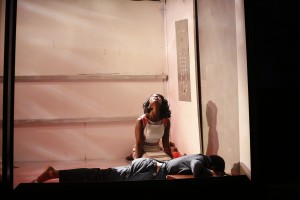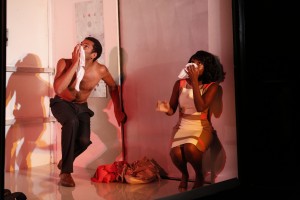BETTER CROSS THIS OFF YOUR LIFT
Nothing quite fits together in Walter Mosley’s flat, agenda-heavy and undisciplined Lift, about a young black man and woman who find themselves trapped in a skyscraper elevator after the building is hit by a terrorist attack; Marshall Jones III’s unfocussed direction doesn’t do the material or his actors any favors.
When a play that takes place in one room over the course of a few hours needs to dim the lights every few minutes to indicate scene changes and time passing, it suggests to me a lack of inspiration on the part of the playwright. Especially in this case, where the room could plummet 300 feet at any moment’”why let the audience off the hook suspense-wise with these unmotivated blackouts? And why make them unmotivated when there are good reasons built into the world of the play for the lights to go dark? This kind of haphazardness permeates Mr. Mosley’s creation; the writing lacks elegance and common sense, and feels like that early, pre-breakthrough draft into which the playwright crams as many ideas and themes as he can’”which in this case include racial politics, S&M, patricide, and drug addiction’”bending and forcing them all to fit, whether they want to or not.
Prior to the attack, the two main characters, Theodore “Big Time” Southmore (Biko Eisen-Martin) and Tina Pardon (MaameYaa Boafo), both white-collar employees of the company whose building they are in, find themselves in the elevator with the company’s president John Thomas Resterly (Martin Kushner). Resterly is white and gives a little speech to Southmore about each ethnicity’s place in the world, including black people: “Blacks, browns too – are indispensible. There’s always a lower caste, a group of people that are our Atlas – holding the world on their shoulders while the rest of us, those with any sense anyway, climb up their backs and into the Promised Land.”
If Resterly then donned a pinwheel hat, took off his pants, and ran through his company’s offices singing “Camptown Races,” I might have believed that speaking this way today in front of two black employees was part of his character. As is, the speech feels unmotivated, as though Resterly is simply mouthing the playwright’s ideas. Psychologically unconvincing, Lift is riddled with examples of this, which make for many silly, laughable, and eye-rolling moments’”moments which drown out the few genuinely funny and insightful bits in the script.
Despite its inherently tense premise, Lift is filled with obstacles that feel contrived. Consider one example: The couple needs a screwdriver. Southmore has a Swiss Army knife. He tries to unscrew the bolt with the blade but the blade chips. Southmore gets upset, not only because he fails to unscrew the bolt, but because the now damaged knife was a gift from his dead father. As far as I know, most Swiss Army knives have actual screwdrivers. Does Southmore have that one model that doesn’t? If so, why even make it a Swiss Army knife? Is there not a more organic way to introduce Southmore’s relationship with his father than with this logically-muddy device? And does the reality of being stuck in an elevator in a burning building really need sentimental inventions to make it more dramatic? So many similarly unnecessary accoutrements dilute the tension of Lift to such an extent that before long I can’t wait for this elevator to plummet.
Mr. Jones makes adequate use of Andrei Onegin’s perilous though somewhat incomplete-looking set and Rocco DiSanti’s effective lighting and projection design, which, along with Toussaint Hunt’s sound effects, really make us feel like the building is collapsing and the elevator is falling. Unfortunately, Mr. Jones is unable to mitigate the play’s flaws, directing it as written and failing to supply his actors with the help that they need. And so although Ms. Boafo and Mr. Martin are charismatic and sympathetic presences on the stage as performers, their characters don’t carry much weight. Shavonna Banks rounds out the cast as a secretary from the hood, Noni Tariq.
photos by Carol Rosegg
Lift
Crossroads Theatre Company
59E59 Theaters
Tues – Thurs at 7:00; Fri at 8;
Sat at 2 & 8; Sunday at 3 & 7
scheduled to end on November 9, 2014
for tickets, call (212) 279-4200 or visit www.59e59.org
